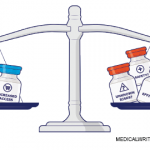“[The director’s] answer was: ‘We’ve tried several times with multiple insurance plans. Unfortunately, the insurance plans have requested that the physician appeal, and we have not been approved even once to use a biosimilar. And from a patient cost perspective, the biosimilar DMARD costs roughly the same; there is a not a cost savings to the patient,” he said.
Biologic manufacturers’ rebates and discounts accrue to pharmacy benefit managers (PBMs) rather than patients in the U.S., said Dr. Fleischmann. Patent disputes among bio-originator and biosimilar manufacturers also stifle competition here, he said.
Dr. Fleischmann questioned non-inferiority data and the nocebo effect cited by Dr. Kay, and argued that the results from the same trials Dr. Kay cited demonstrated that non-inferiority of the biosimilar was not achieved compared to the bio-originator in the majority of indications tested in the Norwegian study and that a clinically meaningful number of patients did not respond adequately, or developed adverse events on the switch to the biosimilar in Denmark.3,4
“Nocebo is a word that comes up when you don’t get the result that you want to see,” he said. In biosimilar trials, 15–30% of patients discontinued the drug after switching, he said. “Not because of the adverse effects, but because they really didn’t have a clinical response. Do you want to call it a nocebo effect, or do you want to call it real life? It is an open question.” Later, in the question and answer section, Dr. Kay suggested that a nocebo effect could be avoided in real life if prescribers frame the switch from a bio-originator to a biosimilar in a positive light.
Are there any data to support the safety and efficacy of multiple switches among biosimilars, Dr. Fleischmann asked, then flashed a blank screen. “There is no evidence,” he said. “The potential effects of multiple switches have not been studied.”
Only reduced cost and greater therapy access for patients support the case for switching, Dr. Fleischmann said. “If I live in Norway, maybe I’ll take the risk. But if I live in the U.S., and I don’t get any benefit? My government doesn’t get any benefit? Only the insurance company benefits? I’m not taking that risk,” he said.
Rebuttals: The Rebate Trap
In his rebuttal, Dr. Kay noted that biosimilars are driving costs down in countries outside the U.S., so there is hope that patient access to all biologics will grow. In Norway, the healthcare system requires competitive bidding among manufacturers. In 2015, the bid price for Remsima, an infliximab biosimilar, was 69% lower than that of its bio-originator, he said.



